初中英语综合实践活动案例-徐蕊
让自主学习为英语教学插上理想的翅膀
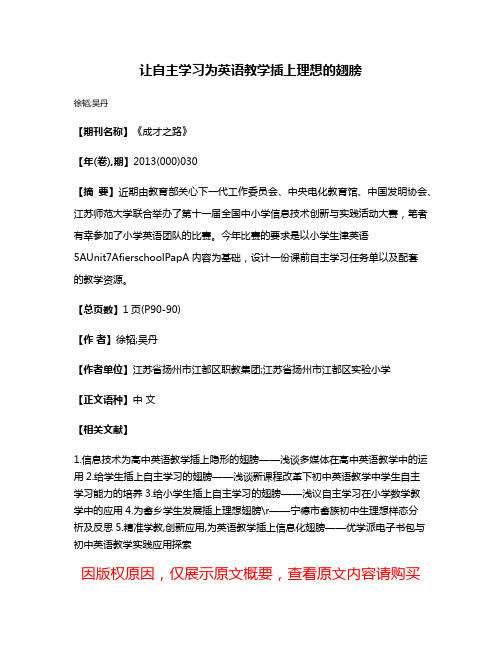
让自主学习为英语教学插上理想的翅膀
徐韬;吴丹
【期刊名称】《成才之路》
【年(卷),期】2013(000)030
【摘要】近期由教育部关心下一代工作委员会、中央电化教育馆、中国发明协会、江苏师范大学联合举办了第十一届全国中小学信息技术创新与实践活动大赛,笔者有幸参加了小学英语团队的比赛。
今年比赛的要求是以小学生津英语
5AUnit7AfierschoolPapA内容为基础,设计一份课前自主学习任务单以及配套
的教学资源。
【总页数】1页(P90-90)
【作者】徐韬;吴丹
【作者单位】江苏省扬州市江都区职教集团;江苏省扬州市江都区实验小学
【正文语种】中文
【相关文献】
1.信息技术为高中英语教学插上隐形的翅膀——浅谈多媒体在高中英语教学中的运用
2.给学生插上自主学习的翅膀——浅谈新课程改革下初中英语教学中学生自主
学习能力的培养3.给小学生插上自主学习的翅膀——浅议自主学习在小学数学教
学中的应用4.为畲乡学生发展插上理想翅膀\r——宁德市畲族初中生理想样态分
析及反思5.精准学教,创新应用,为英语教学插上信息化翅膀——优学派电子书包与初中英语教学实践应用探索
因版权原因,仅展示原文概要,查看原文内容请购买。
青浦初中英语教研活动(3篇)

第1篇一、活动背景随着新课程改革的深入推进,英语教学作为基础教育的重要组成部分,其教学质量直接关系到学生的综合素质和未来竞争力。
为了进一步提升青浦区初中英语教师的教学水平和专业素养,促进教师之间的交流与合作,青浦区教育科学研究院于近日组织了一场主题为“核心素养导向下的初中英语教学策略研究”的教研活动。
本次活动旨在通过研讨、交流和实践,探索符合学生核心素养发展的英语教学新路径。
二、活动目的1. 提高初中英语教师对核心素养的认识,明确其在英语教学中的重要性。
2. 探讨核心素养导向下的初中英语教学策略,提升教师的教学设计能力和课堂实施效果。
3. 促进教师之间的交流与合作,共同提高青浦区初中英语教学质量。
三、活动内容1. 专家讲座邀请了上海市英语教学领域的知名专家进行专题讲座,内容涉及核心素养的定义、英语学科核心素养的内涵及在教学中的应用等。
2. 教学观摩组织了多位优秀初中英语教师进行课堂教学观摩,展示他们在核心素养导向下的教学实践。
3. 教学研讨教师们围绕核心素养导向下的教学策略展开深入研讨,分享教学经验,交流教学心得。
4. 案例分析通过对具体教学案例的分析,探讨如何在教学中融入核心素养的培养。
5. 实践操作组织教师进行教学设计实践,结合核心素养的要求,设计符合学生实际需求的教学活动。
四、活动过程1. 专家讲座环节专家首先对核心素养进行了详细解读,强调了核心素养在英语教学中的核心地位。
随后,结合具体案例,介绍了如何在教学中落实核心素养。
2. 教学观摩环节教学观摩环节中,多位教师展示了他们的课堂风采。
他们以核心素养为导向,通过多样化的教学手段,激发了学生的学习兴趣,提高了课堂效率。
3. 教学研讨环节教师们积极参与研讨,针对核心素养导向下的教学策略提出了自己的看法。
大家一致认为,要关注学生的个体差异,注重培养学生的语言能力、文化意识、思维品质和学习策略。
4. 案例分析环节通过对具体教学案例的分析,教师们更加明确了核心素养导向下的教学策略。
利用信息技术实现英语综合实践活动课的德育渗透
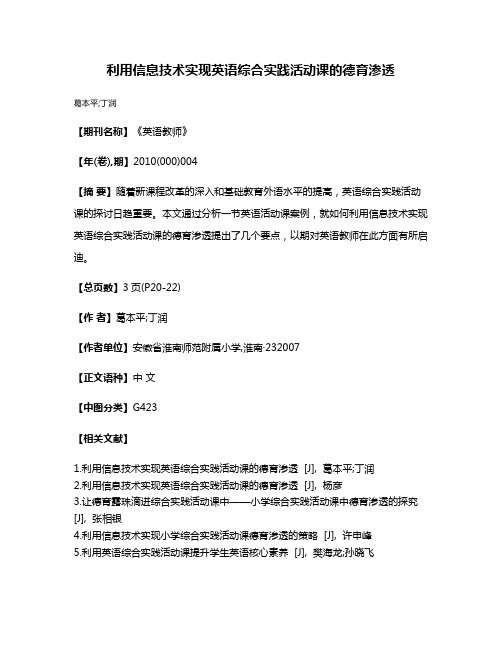
利用信息技术实现英语综合实践活动课的德育渗透
葛本平;丁润
【期刊名称】《英语教师》
【年(卷),期】2010(000)004
【摘要】随着新课程改革的深入和基础教育外语水平的提高,英语综合实践活动课的探讨日趋重要。
本文通过分析一节英语活动课案例,就如何利用信息技术实现英语综合实践活动课的德育渗透提出了几个要点,以期对英语教师在此方面有所启迪。
【总页数】3页(P20-22)
【作者】葛本平;丁润
【作者单位】安徽省淮南师范附属小学,淮南·232007
【正文语种】中文
【中图分类】G423
【相关文献】
1.利用信息技术实现英语综合实践活动课的德育渗透 [J], 葛本平;丁润
2.利用信息技术实现英语综合实践活动课的德育渗透 [J], 杨彦
3.让德育露珠滴进综合实践活动课中——小学综合实践活动课中德育渗透的探究[J], 张相银
4.利用信息技术实现小学综合实践活动课德育渗透的策略 [J], 许申峰
5.利用英语综合实践活动课提升学生英语核心素养 [J], 樊海龙;孙晓飞
因版权原因,仅展示原文概要,查看原文内容请购买。
核心素养下的初中英语课堂教学研究教研组活动记录
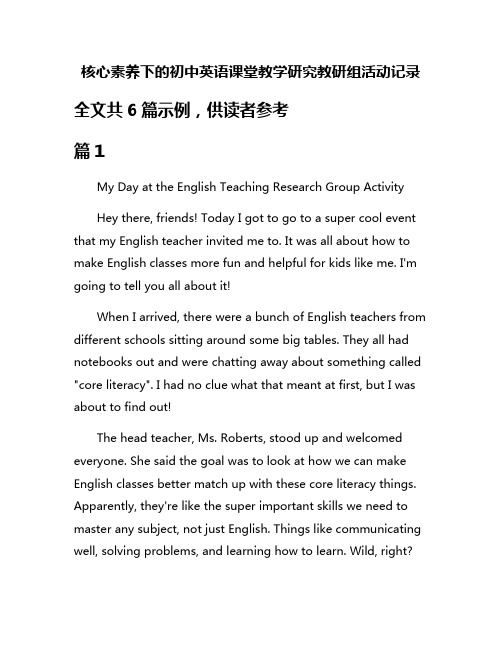
核心素养下的初中英语课堂教学研究教研组活动记录全文共6篇示例,供读者参考篇1My Day at the English Teaching Research Group ActivityHey there, friends! Today I got to go to a super cool event that my English teacher invited me to. It was all about how to make English classes more fun and helpful for kids like me. I'm going to tell you all about it!When I arrived, there were a bunch of English teachers from different schools sitting around some big tables. They all had notebooks out and were chatting away about something called "core literacy". I had no clue what that meant at first, but I was about to find out!The head teacher, Ms. Roberts, stood up and welcomed everyone. She said the goal was to look at how we can make English classes better match up with these core literacy things. Apparently, they're like the super important skills we need to master any subject, not just English. Things like communicating well, solving problems, and learning how to learn. Wild, right?Then Ms. Roberts had us go around introducing ourselves and saying what we thought made a great English class. I said I liked it when we played games and did fun activities to practice instead of just doing bookwork all period. Some teachers agreed and said keeping kids engaged and giving us ways to practice our skills was key.After that, the teachers split into groups to talk morein-depth about different core literacies. The group I joined was all about communication literacy. These teachers wanted to make sure we were really learning how to listen, speak, read, and write effectively in English.They discussed ways to get us using English more in class, like having more discussions and conversations instead of just repeating after the teacher or the book. One teacher even suggested putting on short plays to get us speaking English in fun contexts. Another brought up focusing more on stuff we'd actually need to communicate about in real life, like ordering food or asking for directions. Hands-on practice for real communication? Sign me up!The reading literacy group had some awesome ideas too. Like using cool stories, articles, and books that actually interest kids our age instead of the boring stuff in our textbooks. Theyalso wanted to teach us strategies for things like figuring out tricky vocabulary from context instead of just memorizing lists of words. Sounds way better than staring at word lists all night if you ask me!In the afternoon, we broke for lunch. A bunch of students were there too, and we got to share our thoughts on English class with the teachers over some tasty pizza. I told them how bored I get just doing grammar drills from the book day after day. Like, when am I ever going to need to know the difference between the present perfect continuous and past perfect continuous tenses when I'm older? We hardly ever get to just practice speaking naturally.After lunch, the teachers re-grouped to share what they had discussed so far. There were lots of nods when the reading literacy squad suggested skipping some of those random grammar lessons and spending more time on high-interest readings. Then we could practice things like analyzing the author's purpose or making connections to our lives. Finally, some English work that feels useful!The last group I'll tell you about focused on something called learning literacy. Basically, it was all about teaching us strategies to become better, more independent learners. Likeasking questions when we're confused, setting goals for what we want to learn, and figuring out study habits that work best for each of us. The teachers had ideas for getting us to take more ownership over our English learning. I loved the idea of letting us pick some of the topics we'd learn about to make things more motivating.Finally, it was time for the teachers to start putting together an action plan for updates they wanted to make to their English curriculums based on the day's discussions. There was a lot of excited note-sharing and brainstorming happening. I could tell these teachers really wanted to find ways to make English class more relevantand meaningful for kids.As we were leaving, Ms. Roberts thanked me and the other students for coming to share our perspectives. She said it was so important for students to have a voice in designing instruction that actually meets our needs. I felt proud that they really listened to what we had to say instead of just talking over us.Overall, the whole experience gave me a lot of hope that English classes could start to feel a lot more applicable to our lives. I can't wait to see what creative, engaging lessons and units these teachers come up with next year! No more treating English like a bunch of random rules and pointless tasks to check off. Ifthe teachers really follow through on prioritizing core literacies, I think we'll finally get to experience English as a toolbox of awesome communication and thinking skills. The kind of skills that'll be valuable no matter what we end up doing in the future. Now that's an English class I can get excited about!篇2Title: My Big Bro's Fun English ClassesHi there! My name is Lily, and I'm a 10-year-old primary school student. Today, I want to tell you about the really cool English classes my big brother Tim takes at his middle school. You see, his English teacher, Mrs. Wang, is part of this special group called the "Core Literacy Guidance Research Group." I know, it's a mouthful, right? But trust me, the stuff they do is super interesting!Last week, I got to tag along with Tim to his school and sit in on one of his English classes. Let me tell you, it was nothing like the boring old classes I used to imagine. Mrs. Wang had all sorts of fun activities and games planned, and she made sure everyone in the class was involved and having a good time.The class started with a warm-up game called "Word Scramble." Mrs. Wang would write a jumbled-up word on theboard, and the students had to race to unscramble it and shout out the right answer. It was hilarious watching everyone get all flustered and competitive, but it was also a great way to get their brains fired up for the lesson.After the warm-up, Mrs. Wang introduced the topic for the day: describing people's appearances and personalities. Now, this is where it got really cool. Instead of just lecturing from the textbook, she had the students work in small groups and create skits about different characters. Each group had to come up with a character's physical description, personality traits, and a short dialogue showcasing those traits.I got to help Tim's group with their skit, and let me tell you, we had a blast! Our character was a clumsy but kind-hearted superhero named "The Butter-fingered Avenger." We described him as having messy hair, a crooked mask, and a cape that was always getting caught on things. But despite his clumsiness, he was always willing to help others and never gave up, no matter how many times he tripped or dropped his super-gadgets.When it was time to perform the skits, the whole class was in stitches! Each group had come up with such creative and hilarious characters, and it was so much fun watching everyone act out their dialogues and scenarios. Even Mrs. Wang got in onthe fun, donning a silly wig and joining in one of the skits as a wacky villain.After the skits, Mrs. Wang led a discussion about the different character traits and how they were portrayed through the dialogues and actions. She encouraged the students to analyze and critique each other's skits, focusing not just on the language and grammar but also on the deeper themes and messages.One of the things I really liked was how Mrs. Wang emphasized the importance of understanding different cultures and perspectives. She pointed out that certain personality traits might be valued differently in different cultures, and it's important to be open-minded and respectful of those differences.Throughout the class, I could see how Mrs. Wang was helping the students develop not just their English language skills, but also their critical thinking, creativity, and cultural awareness – all part of that "core literacy" thing the research group focuses on.During the break, I got to chat with Mrs. Wang and some篇3Here's a 2,000-word article written in English, from the perspective of a middle school student, about a research group activity on English classroom teaching under the core literacy framework:My English Class is So Much Fun Now!Hey there! Lily here, an 8th grader who used to dread English class. But things have changed big time since my teachers started doing things differently. Let me tell you all about it!It all began a few months ago when our English teachers announced they were part of this cool "research group" focused on making our classes more engaging and meaningful. At first, I was like "Yeah, right, another boring teacher thing." Boy, was I wrong!The first thing they did was have us take these surveys about our interests, learning styles, and what we struggled with in English class. I honestly answered that I found grammar lessons snooze-worthy and reading ancient literature pretty dull. To my surprise, they actually listened!Grammar Becomes a GameInstead of those mind-numbing grammar drills, my teacher Ms. Roberts started turning grammar practice into fun gamesand competitions. We use online platforms like Kahoot and Quizlet Live to race against classmates in identifying parts of speech or editing sentences. The losing team has to do amusing forfeits like singing cheesy English pop songs. It's hilarious!We also do grammar relays where we passing around whiteboards and correct mistakes on sample sentences. Ms. Roberts makes it highly competitive and energetic. I've learned way more grammar through these activities than I ever did from worksheets.Literature I Can Relate ToAs for reading, we've moved away from just analyzing old fiction nobodycares about. Now we read contemporary young adult novels, interesting articles, and even look at lyrics to popular songs. The readings are always relatable to modern teenage life.For example, we read this awesome book called "The Hate U Give" that deals with racism and police brutality. We had powerful class discussions about the tragic real-life events that inspired the novel. My opinion actually mattered for once!We still analyze things like theme, character development, and literary devices. But doing it with culturally-relevant materials makes it way more interesting and meaningful.Projects GaloreAnother major change has been the increase inproject-based learning. We get to work in groups and get creative with presenting what we've learned in fun ways.For our poetry unit, my group reformed famous poems as rap songs and performed them while wearing cool outfits we designed ourselves. I was a little nervous at first, but it ended up being a blast!We've also made public service announcement videos, podcasts, websites, you name it. Thisallow us to build communication skills that go way beyond writing essays.The Human ConnectionHonestly, what I appreciate most is how my teachers strive to really get to know us and create an supportive classroom community. We start every class with informal chats about our weekends, challenges we're facing, or just jokes to lighten the mood.When we discuss heavy topics, my teachers validate our perspectives and emotions. They've earned our trust and respect.During remote learning, we had optional lunchtime "hangouts" on Zoom so we could stay connected. Some kids even shared about personal struggles they were going through, and our teachers listened with compassion.We've had a few guests join our classes too. Like this published author who Video called in and gave us advice about creative writing. And a conversant who immigrated from China, which gave us cultural insights while practicing our speaking skills.Looking ForwardSoyeah, I'd say my English class has undergone an awesome transformation! The projects, the discussions, thecommunity-building - it's all centered around developing core skills like communication, critical thinking, creativity, andcross-cultural understanding.These are abilities I'll definitely need for college and beyond. More importantly, I've gained confidence as a lifelong learner and grown as a person along the way.English class is now my favorite period of the day. Crazy, right? I'm actually going to miss it when I graduate. Thanks to my teachers' innovative approach, I've become a better student and a better human being. How lucky am I?篇4My English Class is So Much Fun Lately!You won't believe what's been happening in my English class! Mrs. Jones has been trying all these new teaching methods and it's making learning English way more interesting and engaging. She said it's all about developing our "core literacy" which is like the key skills we need to really understand and use English well.It started a few weeks ago when she joined this "research group" with some other English teachers. They meet up regularly to discuss new strategies for English instruction aligned with the core literacy principles. From what I can tell, core literacy covers things like reading comprehension, communication skills, critical thinking, and cultural awareness. Basically, the goal is for us to do more than just memorize vocab words and grammar rules. Mrs. Jones wants us to really understand how the English language works and be able to apply it in practical ways.One of the first changes she made was to our reading activities. Instead of just having us read boring passages and answer comprehension questions, she started picking more engaging and relevant texts. We've read news articles about things middle schoolers care about like social media, video games, and sports. We've analyzed lyrics to popular songs. We even did a whole unit on internet memes and viral videos!The cool thing is that Mrs. Jones doesn't just have us read and answer questions anymore. She has us discuss and debate what we read, analyze the language and writing techniques the authors use, and even try our hand at creating our own texts in similar styles. It's a lot more interactive and gets us really thinking critically about the material.For instance, after reading this article about a new Marvel movie, Mrs. Jones had us break into small groups. We had to prepare a mock "pitch" like the writers and producers would do to get the movie made. Each group had to come up with an original story concept, cast of characters, plot summary, and sample snippets of dialogue. Then we had to present it to the class and "sell" them on why our idea was the best. It was so fun and pushed us to get creative with the language skills we've learned.Another way Mrs. Jones has updated her teaching is by having us do more project-based work. A couple weeks ago, our assignment was to create a short video tour of our school or neighborhood — but here's the catch: we had to write and record all the narration in English! It was a big challenge, but we had to use our skills in writing, vocabulary, pronunciation, and even video editing.Some groups really went all out and added animated graphics, original music, and cool editing effects to their videos. We had a blast filming them, even though there were definitely some bloopers and cringe-y moments. But that was half the fun! In the end, we learned a ton about putting our English skills to use for a real, creative purpose.My personal favorite activity so far was the cultural immersion project Mrs. Jones had us do. She put us in small groups and assigned each team a different English-speaking country or region to research — everything from its history and traditions to its pop culture, slang, and cuisine. The big finale was that each group had to transform our classroom篇5A Research Day at SchoolHey there! Today I'm gonna tell you all about this super cool research day we had at school recently. It was all about how we learn English in the classroom and this new thing called the "core literacy" approach. I know, I know, it sounds kinda boring. But trust me, it was actually really interesting!So let me set the scene. Our English teachers gathered all the middle school students into the auditorium. They told us we were going to spend the day doing some group activities and discussions about English class. At first, I was like "Ugh, do we have to?" But then they said there篇6My School's English Teaching Research Adventure!Hi there! My name is Lily and I'm a 7th grader at Sunshine Middle School. I love learning English and wanted to share an exciting thing our English teachers did this year called a "teaching research group". It was all about making English classes better by focusing on what they call "core literacy". Let me tell you all about it!It started last summer when all the English teachers got together for a big meeting. They said English class shouldn't just be about memorizing vocabulary and grammar rules. Instead, weneed to develop important skills like communication, critical thinking, creativity and more. The teachers called these the "core literacies" for English.Ms. Roberts, who is the English Department Head, explained that core literacy means we learn English in a way that prepares us for the real world. We don't just do bookwork, but get lots of practice using English to explore ideas, solve problems and express ourselves. That sounded way more fun to me than just doing worksheets all the time!So the teachers formed this "research group" to figure out the best ways to teach English with core literacy. All year long, they met regularly to discuss new teaching strategies, share lesson plans, and learn from each other. It was like a book club but for becoming better teachers!One of the first things they did was observe each other's classes. Ms. Yang went to Mr. Fred's class to watch him teach a lesson on storytelling. She noticed he had students working in groups to create and act out their own silly stories. The students were laughing, using a ton of English, and seemed to really enjoy it. Creativity in action!After the lesson, Ms. Yang and Mr. Fred talked about what worked well and how he planned the activity to build core skills.Mr. Fred explained he first had students learn story elements like characters and plot. Then they practiced telling simple stories and giving feedback to each other. Only after lots of preparation did they get to create their own ridiculous tales. It was astep-by-step process focused on self-expression and communication. So clever!The research group talked a lot about engaging activities like skits, debates, multimedia projects and more. Ms. Roberts said the human brain learns best when it's having fun and feels a sense of accomplishment. If we're just copying from a textbook, our minds start to wander. But when we're being creative and working towards a goal we care about, we naturally soak up the language while developing those core literacies.The teachers also redesigned some of their tests and homework to align with core literacy. For example, instead of just asking us to write sentences using vocabulary words, we had to write a whole paragraph or story using context clues to demonstrate understanding. Or we took ideas from the textbook and had to analyze, critique or re-write them to。
初中英语综合实践课背景下的语言项目学习
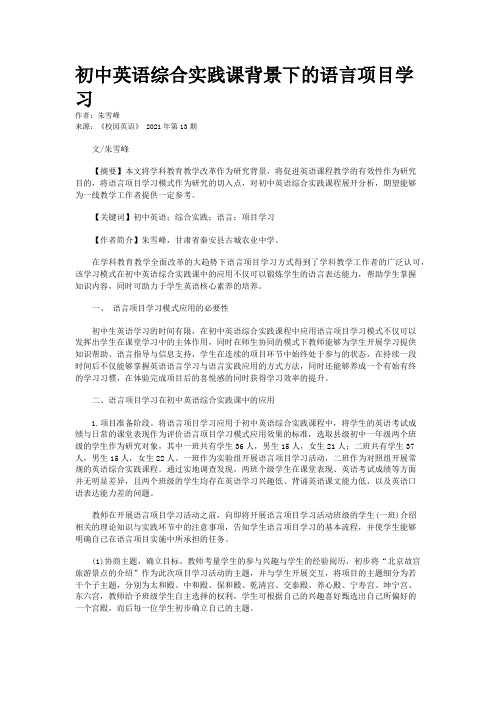
初中英语综合实践课背景下的语言项目学习作者:朱雪峰来源:《校园英语》 2021年第13期文/朱雪峰【摘要】本文将学科教育教学改革作为研究背景,将促进英语课程教学的有效性作为研究目的,将语言项目学习模式作为研究的切入点,对初中英语综合实践课程展开分析,期望能够为一线教学工作者提供一定参考。
【关键词】初中英语;综合实践;语言;项目学习【作者简介】朱雪峰,甘肃省秦安县古城农业中学。
在学科教育教学全面改革的大趋势下语言项目学习方式得到了学科教学工作者的广泛认可,该学习模式在初中英语综合实践课中的应用不仅可以锻炼学生的语言表达能力,帮助学生掌握知识内容,同时可助力于学生英语核心素养的培养。
一、语言项目学习模式应用的必要性初中生英语学习的时间有限,在初中英语综合实践课程中应用语言项目学习模式不仅可以发挥出学生在课堂学习中的主体作用,同时在师生协同的模式下教师能够为学生开展学习提供知识帮助、语言指导与信息支持,学生在连续的项目环节中始终处于参与的状态,在持续一段时间后不仅能够掌握英语语言学习与语言实践应用的方式方法,同时还能够养成一个有始有终的学习习惯,在体验完成项目后的喜悦感的同时获得学习效率的提升。
二、语言项目学习在初中英语综合实践课中的应用1.项目准备阶段。
将语言项目学习应用于初中英语综合实践课程中,将学生的英语考试成绩与日常的课堂表现作为评价语言项目学习模式应用效果的标准,选取县级初中一年级两个班级的学生作为研究对象,其中一班共有学生36人,男生15人,女生21人;二班共有学生37人,男生15人,女生22人。
一班作为实验组开展语言项目学习活动,二班作为对照组开展常规的英语综合实践课程。
通过实地调查发现,两班个级学生在课堂表现、英语考试成绩等方面并无明显差异,且两个班级的学生均存在英语学习兴趣低、背诵英语课文能力低,以及英语口语表达能力差的问题。
教师在开展语言项目学习活动之前,向即将开展语言项目学习活动班级的学生(一班)介绍相关的理论知识与实践环节中的注意事项,告知学生语言项目学习的基本流程,并使学生能够明确自己在语言项目实施中所承担的任务。
中学英语课堂:让学生成为策略型的学习者
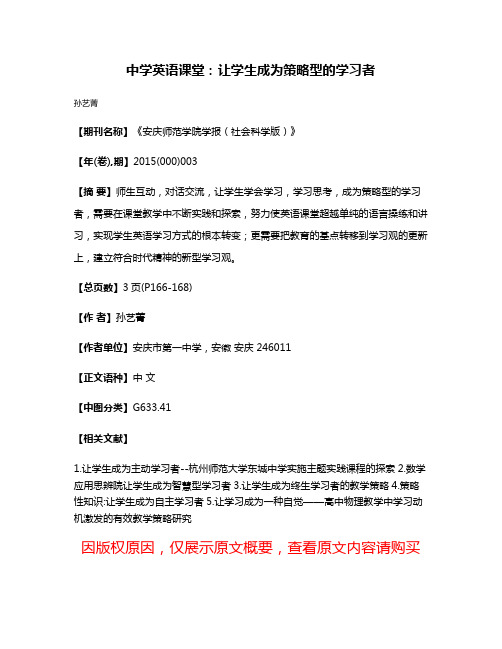
中学英语课堂:让学生成为策略型的学习者
孙艺菁
【期刊名称】《安庆师范学院学报(社会科学版)》
【年(卷),期】2015(000)003
【摘要】师生互动,对话交流,让学生学会学习,学习思考,成为策略型的学习者,需要在课堂教学中不断实践和探索,努力使英语课堂超越单纯的语言操练和讲习,实现学生英语学习方式的根本转变;更需要把教育的基点转移到学习观的更新上,建立符合时代精神的新型学习观。
【总页数】3页(P166-168)
【作者】孙艺菁
【作者单位】安庆市第一中学,安徽安庆 246011
【正文语种】中文
【中图分类】G633.41
【相关文献】
1.让学生成为主动学习者--杭州师范大学东城中学实施主题实践课程的探索
2.数学应用思辨院让学生成为智慧型学习者
3.让学生成为终生学习者的教学策略
4.策略性知识:让学生成为自主学习者
5.让学习成为一种自觉——高中物理教学中学习动机激发的有效教学策略研究
因版权原因,仅展示原文概要,查看原文内容请购买。
七年级英语综合实践活动案例
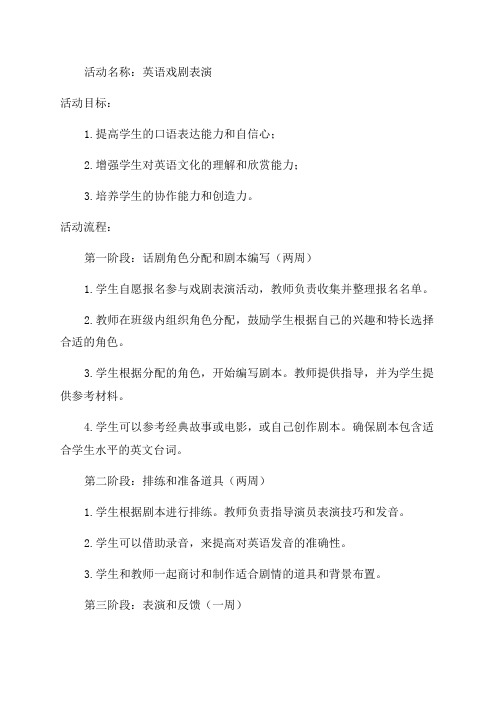
活动名称:英语戏剧表演活动目标:1.提高学生的口语表达能力和自信心;2.增强学生对英语文化的理解和欣赏能力;3.培养学生的协作能力和创造力。
活动流程:第一阶段:话剧角色分配和剧本编写(两周)1.学生自愿报名参与戏剧表演活动,教师负责收集并整理报名名单。
2.教师在班级内组织角色分配,鼓励学生根据自己的兴趣和特长选择合适的角色。
3.学生根据分配的角色,开始编写剧本。
教师提供指导,并为学生提供参考材料。
4.学生可以参考经典故事或电影,或自己创作剧本。
确保剧本包含适合学生水平的英文台词。
第二阶段:排练和准备道具(两周)1.学生根据剧本进行排练。
教师负责指导演员表演技巧和发音。
2.学生可以借助录音,来提高对英语发音的准确性。
3.学生和教师一起商讨和制作适合剧情的道具和背景布置。
第三阶段:表演和反馈(一周)1.学生进行表演,可以在班级内或其他年级的英语课上进行。
2.学生和观众一起欣赏其他班级的表演,相互给予反馈和建议。
3.教师也对每个演员进行评价,并给予鼓励和指导。
第四阶段:总结和展示(两天)1.学生和教师一起总结这次活动的收获和不足之处。
2.学生利用展示板或PPT展示他们的表演过程和心得体会。
3.学生互相交流展示,并相互取经和学习。
活动效果评估:1.活动过程中的观察记录;2.学生的演技和发音的进步;3.学生展示板或PPT的质量和内容。
活动期待效果:1.提高学生的口语表达能力和自信心;2.增强学生对英语文化的理解和欣赏能力;3.培养学生的协作能力和创造力。
活动反思总结:本次英语戏剧表演活动,为学生提供了一个展示和发展他们英语口语能力的机会。
活动中,学生通过分角色编写剧本、参与排练和表演,有效提高了他们的英语表达和演技技巧。
此外,通过观看其他班级的表演,学生不仅增加了对英语文化的理解和欣赏,也在互动中学习和成长。
活动总结后的展示环节,使学生能够总结自己在活动中的收获和不足,相互交流展示,进一步提高了他们对英语的学习兴趣和自信心。
莱西初中英语教研(3篇)
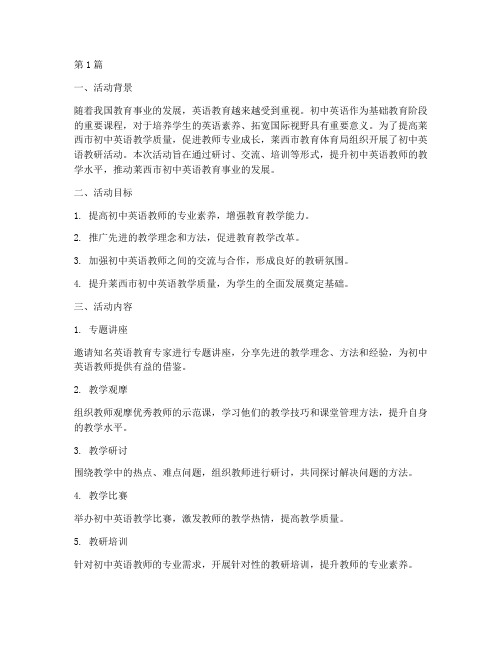
第1篇一、活动背景随着我国教育事业的发展,英语教育越来越受到重视。
初中英语作为基础教育阶段的重要课程,对于培养学生的英语素养、拓宽国际视野具有重要意义。
为了提高莱西市初中英语教学质量,促进教师专业成长,莱西市教育体育局组织开展了初中英语教研活动。
本次活动旨在通过研讨、交流、培训等形式,提升初中英语教师的教学水平,推动莱西市初中英语教育事业的发展。
二、活动目标1. 提高初中英语教师的专业素养,增强教育教学能力。
2. 推广先进的教学理念和方法,促进教育教学改革。
3. 加强初中英语教师之间的交流与合作,形成良好的教研氛围。
4. 提升莱西市初中英语教学质量,为学生的全面发展奠定基础。
三、活动内容1. 专题讲座邀请知名英语教育专家进行专题讲座,分享先进的教学理念、方法和经验,为初中英语教师提供有益的借鉴。
2. 教学观摩组织教师观摩优秀教师的示范课,学习他们的教学技巧和课堂管理方法,提升自身的教学水平。
3. 教学研讨围绕教学中的热点、难点问题,组织教师进行研讨,共同探讨解决问题的方法。
4. 教学比赛举办初中英语教学比赛,激发教师的教学热情,提高教学质量。
5. 教研培训针对初中英语教师的专业需求,开展针对性的教研培训,提升教师的专业素养。
四、活动成果1. 教师专业素养得到提升通过本次活动,莱西市初中英语教师的专业素养得到了显著提高,教育教学能力得到增强。
2. 教学质量得到提高活动期间,各学校初中英语教学质量得到明显提升,学生英语学习兴趣和成绩不断提高。
3. 教研氛围浓厚活动期间,莱西市初中英语教师积极参与教研活动,形成了良好的教研氛围。
4. 教学资源丰富活动期间,各学校纷纷分享自己的教学资源,为其他学校提供了宝贵的借鉴。
五、活动总结1. 加强组织领导,确保活动顺利进行本次教研活动得到了莱西市教育体育局的高度重视,各级领导亲自参与,确保了活动的顺利进行。
2. 注重实效,提高活动质量活动期间,各环节紧密衔接,注重实效,确保了活动质量。
- 1、下载文档前请自行甄别文档内容的完整性,平台不提供额外的编辑、内容补充、找答案等附加服务。
- 2、"仅部分预览"的文档,不可在线预览部分如存在完整性等问题,可反馈申请退款(可完整预览的文档不适用该条件!)。
- 3、如文档侵犯您的权益,请联系客服反馈,我们会尽快为您处理(人工客服工作时间:9:00-18:30)。
初中英语综合实践活动
安匠初级中学徐蕊
为促进实施英语素质教育,进一步开展英语综合实践活动课教学工作,从而激发学生学习英语的兴趣,积累学生的英语知识,提高学生的语言运用能力,发展学生的非智力因素,我设计了这节英语综合实践活动课。
一、活动背景分析
现在网络联入我们的生活,与我们生活息息相关。
网络是一把双刃俭,给我们注入新鲜血液的同时,也给我们带来一些毒素。
危害也不可小觑。
特别是一些青少年,他们的生理、心理处在急剧变化的阶段,很不成熟,一旦迷恋上游戏,往往难以自拔,轻则荒废了学业,损害了身体,重则引发违法、犯罪事件。
对学生进行教育,光靠说教难以收到预期效果。
为了帮助学生了解电脑游戏的危害,引导学生正确对待电脑游戏,走出沉迷电脑游戏的误区,于是,我组织学生开展综合实践活动,让学生在活动中去感受、体验,受到教育。
二、活动对象及时长
八年级全体学生,一周
三、活动目标
1. 使学生正确看待网络
2. 通过活动,提高学生对英语课的学习兴趣。
3. 学会在实践调查活动中,提高发现问题、分析问题、解决问题的能力。
4. 在活动中学会交往与合作,促进学生良好个性的发展。
四、活动准备
(一)确立活动主题
1. 调查本班学生常玩哪些电脑游戏
2. 用英语表述怎样玩这些游戏
3. 搜集电脑游戏受害者的有关情况,分析其危害;
4. 搜集人们对电脑游戏的看法
(二)制定活动方案
在确定了研究主题后,由小组内成员推选出本组组长,因为这是一个辩论,正方反方已分好,所以组长应综合整理大家搜集的材料,提炼支持自己论点的材料。
五、活动过程
1. 笔者担任主持人
2. 邀请英语教师们担任评委,评委一一就座,负责教师分发评分标准及评分表格。
3. 将全班同学分成八组,正方四组,反方四组。
每一组推出一个发言人,其他同学在其背后组成一个支持团队,大家互相合作,就对方的观点进行讨论并提出自己的观点,反驳对方,支持自己。
4. 比赛开始,参赛学生依次发表自己的看法,比赛气氛十分热烈,掌声不断。
评委教师们或沉吟落笔,或商量画分……都十分认真。
六、活动评析
(一)教师的教育教学能力得到了提高和锻炼
通过课题研究,教师对于学生的教育教学能力得到了提高和锻炼,师生关系更加密切、融洽。
学生的综合语言运用能力得到了培养和发展,通过研究,学生在语言知识、语言技能
方面的掌握情况呈上升趋势。
(二)学生的收获
1. 激发了学生学习英语的兴趣和积极性。
中学英语课外实践活动能激起学生内在的学习动机,发展他们的个性特长,有了浓厚的兴趣,学生才会有愉悦的学习情绪,有了愉悦的学习情绪,学生的学习才会变得主动,有了新颖的学习方法,才会产生创造性的思维火花,有了优异的学习成绩,才会形成良好的班风。
2. 培养了学生用英语表达思想和交际的能力。
实践活动可使学生较快地培养起用英语进行思维、表达思想和交际的能力,口语是操练人在非正式场合、在无准备的情况下使用的无拘束的言语,口语的无准备性不允许言语活动者通过翻译来表达思想理解对方的话语,久而久之,学生的这种交际能力会不断提高。
3. 使学生的参与意识加强了,启发了学生的发散性思维,开发智力,培养能力。
4. 培养了学生的竞争意识、创新能力、组织能力。
5. 学生掌握了课外实践活动的方式、方法、过程,乐于积极参与,敢于大胆尝试,学会了积累,敢于并善于表现自己,使英语学习变得轻松、愉悦。
(三)英语教师的认识和体会
1. 实施中学英语课外实践活动的作用。
中学英语课外实践活动,激发了学生学习英语的兴趣和积极性,培养了学生用英语表达思想和交际的能力,加强了学生的参与和认识,启发了学生的发散性思维,培养了学生的竞争意识、创新能力、组织能力。
2. 进行中学英语课外实践活动是一项长期而繁杂的地工作,教师要循序渐进,将课外实践活动逐步开展下去。
3. 有关时间和精力问题。
教师在设计各项实践活动课时,必须充分考虑每一个活动的时间以及范围,尽量使操作步骤直接一些,次数不宜过多,最好要与教学内容保持一致,要考虑学生的实际英语水平,内容贴近学生生活,密切结合课堂教学。
4. 应加强教师培训。
5. 课题研究中存在进一步探讨的问题,如何进一步规范和完善课外实践活动,不断研究开发出新的评价工具和评价手段。
活动在教师们的努力下圆满完成了,学生参与活动的积极性非常高。
这次活动通过两周的查找资料,准备资料,学生既充实了自己的英语知识,也培养了学生间互帮互助的良好品德。
比赛过程较为流畅,也取得了圆满成功。
通过这次活动,还提高了学生的英语学习积极性,达到了预期的目标,取得了良好的活动效果。
以后还要适当安排学生类似的实践活动,争取能让英语更贴近学生心灵。
不足之处在于活动需要一定的时间,只能偶尔为之。
在今后应多组织这样的活动,让学生在基本的语言环境中学英语,则更加符合于语言是在实际情景中学的最佳原则。
